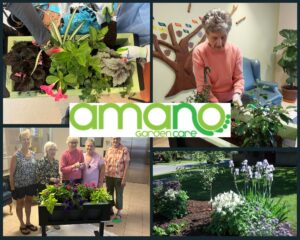As part of our SE Spotlight series, CSED recently sat down with Jay Young, Project Manager with Carebridge Community Support, to learn more about the Neighbourhood Tomato Community (NTC) Farm Project, the people they serve and what they aspire to do.
What does your social enterprise do?
The Neighbourhood Tomato Community (NTC) Farm Project builds upon the mission of the already thriving NTC Gardens network in Mississippi Mills to expand locally-grown sustainable food production, ensure food security for vulnerable populations and empower the community to respond to the current challenges of both the pandemic and climate change impacts. We currently offer educational programming and are beginning a foster tree program as a social enterprise project with the local youth centre.
Where are you located and when was the social enterprise started?
The farm project is located in Mississippi Mills. We started to develop the idea in the summer of 2020.
What was the inspiration behind your social enterprise?
The project is a local response to the pandemic and addresses serious issues in Mississippi Mills. Food security and climate change mitigation are increasingly affected by the ongoing pandemic and will be impacted throughout the impending recovery. Food security and climate change mitigation are challenges that we can face if we all work together to grow back better during our recovery from the pandemic.
Tell us about the people you serve? How do they typically find you?
Carebridge Community Support, a local community service agency, has introduced the Community Farm as Mississippi Mills’ response to the global pandemic that addresses local food security needs for the most vulnerable members of the community. We connect to our community through the NTC Garden Network to provide for those who need it most and educate and empower the whole community to become more food literate and address food security challenges.
How has CSED helped you?
CSED has been invaluable in assisting us to clarify our project goals, objectives and defining the needs of our prospective partners, customers and the larger community. We hope to design the NTC Farm to be a sustainable and viable enterprise into the future and CSED has helped us to understand how to do that. We are excited to continue our relationship with them to guide our progress and establish a social enterprise model for the ongoing development of the NTC Farm Project.
What challenges do you face day to day?
As this project is still in its early developmental stages, we are faced with the challenges of considering all the various elements of the initial project development, even as the community attempts to recover from the pandemic and return to normal routines. It has been challenging connecting with people effectively and generating enthusiasm about the project during these challenging times, but we are encouraged by the ongoing loosening of restrictions that will allow us to continue outreach.
How has COVID-19 affected your activities and what are you doing to respond?
The global pandemic has impacted our ability to communicate our efforts to the community. From challenges with effective community outreach via online communication channels to the ability to offer meaningful opportunities to collaborate with our project partners and other stakeholders, the pandemic has limited our potential to connect with the community that we wish to serve and derive support from the larger community of which we are a part. However, we have pivoted and shifted our focus to the operation of a virtual farm, with online educational programs, and developing relationships through digital community outreach, while continuing the ongoing project development, through online consultation and services through CSED.
What are some of the lessons you and your team have learned along the way?
We have learned that a project of this scope requires extensive planning, effective communications and broad community support. There are many elements of the project that need to be integrated and we have developed a comprehensive project workplan. CSED has been an integral part of this development of understanding of who we serve, how we serve them and the most effective methods to do that while supporting ourselves through the application of a social enterprise model.
What makes you most proud?
We are most proud of the impacts we already make to our community through the Gardens network, which we are expanding and supporting to provide more food for more people. Whether garden allotments for those who need to grow their own food or education programs that harness the talents of master gardeners to pass on their knowledge, the NTC Farm Project is stewarding the development of a culture of people growing for themselves and others. We are developing this project as a centre of excellence.
What keeps you up at night?
The coordination of all the various elements of the Community Farm project keeps us up at night because we have many disparate, yet integrated, aspects of the project that all need to be considered and coordinated to effectively move this project along. From education and community outreach, to fund development and logistical preparations, we are delivering a diversity of project elements concurrently with early project development and planning for our sustainable future.
What is your vision moving forward?
As the NTC Farm Project is still in its early development and essentially a virtual farm, we are eager to get our hands dirty and work towards establishing a site and getting food grown for and with more people in Mississippi Mills. We have supported the Community Gardens network to develop a cohesive governance structure and improve their capacity to produce more food for more people, but we are excited to broaden our impact through the ongoing development of the Community Farm.



